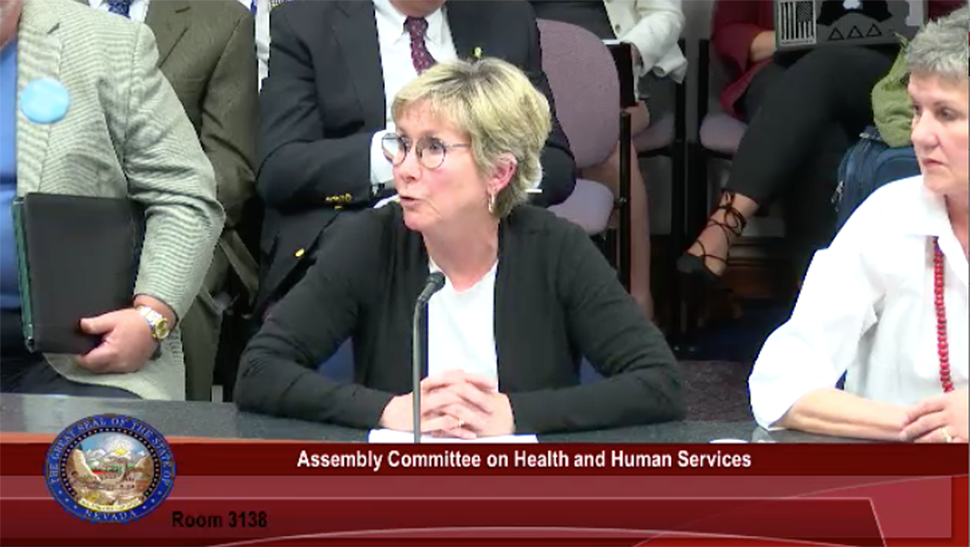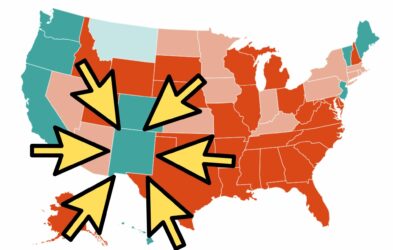This is a full transcript of the testimony of Dr. Carol Parrot, MD, at the May 29, 2017 hearing of the Nevada State Assembly Committee on Health and Human Services in support of SB 261, an assisted death bill. We have formatted the testimony and added subheadings for clarity.
*
Chair Sprinkle, Members of the Health Care Committee. Thank you for allowing me to present to you today. My name is Carol Parrot, and I am a licensed physician from Washington State. After practicing anesthesiology for 30 years, I retired and now work as a volunteer physician with terminally ill patients. This is the most thankful patient population with whom I have ever worked. Over the past 5 years, I have treated a number of patients who have diligently worked their way through the safeguards and processes of our Death with Dignity law in Washington.
Patient Protections in Death with Dignity Laws
The laws in Washington, Oregon, California, Vermont, and Colorado, as well as this law you are considering today, are written with patient protection as a paramount goal. Only dying patients are eligible, using the same six-month standard as required for hospice care programs. Each request for Death with Dignity must come from the patient himself, and must be totally voluntary. The individual patient must ask to use this law three different times, with waiting periods between to think about it. Every patient must be mentally competent to make decisions.
In 2015, 127 different Washington physicians participated in qualifying patients for Death with Dignity. Physicians for these patients try to make sure each patient has a peaceful, comfortable, safe death. Patients are always strongly encouraged to discuss the option ofDeath with Dignity with their families who often mend broken bridges and participate through the end. As a physician, I am required to discuss with them all of their end-of-life options, which includes hospice care and palliative sedation. In Washington, as in Oregon, the vast majority (85%) of patients using this law are enrolled in hospice. Most are surrounded with family and friends when they self-ingest the medication. It is a painless death of comfort and peace for the patient and, to quote a supporting family member, an amazing experience of happiness and sadness for everyone there.

Insurance vs. Death with Dignity
It has been argued that insurance companies are pushing patients into making this decision. No insurance company in the country could force their patients go through this process. Only committed patients of sound mind and free will make it through the rigorous requirements of the law. Analysis of the data from the more than 2400 patients in Oregon and Washington who have used the Death with Dignity law since 1998 shows no indication of the ‘slippery slope’ that has been threatened for the past 20 years.
Additionally, in Washington State, patients are required to pay for life-medications with their own funds. Private insurance has refused coverage of the cost of medications for every one of my patients, as has Medicaid. Because Medicare is a federal program, no cost reimbursement is available. For this reason, last summer, I worked with a team of physicians in Washington, organized by End of Life Washington, to offer a new, effective, safe, reliable, lower cost medication regimen (DDMP2) to our patients. After completed trials and modifications, this drug regimen is now being offered as an alternative to expensive secobarbital, in all states where physician–aided-dying is legally available.
It is a painless death of comfort and peace for the patient and, to quote a supporting family member, an amazing experience of happiness and sadness for everyone there.
End of Life Washington
End of Life Washington is a non-profit organization that offers information and support to physicians, pharmacists and patients working with end of life issues. Trained client support volunteers are available to assist patients and their families throughout the state.
Since 2009, End of Life Washington has been tracking data on their clients who chose to use DWD. The Volunteer Medical Directors routinely communicate with participating physicians and pharmacies, to ensure they have the most up-to-date information on the drug regimens available. This information is readily shared both nationally and internationally with physicians and appropriate organizations.
Human Right for Nevada
I would like to end with this thought: I truly hope that you consider allowing the diverse residents of the state of Nevada this human right and dignity. Most of your constituents will
not choose it, but those who do, and their families, will thank you forever.
I appreciate your time and attention today.

No comments.